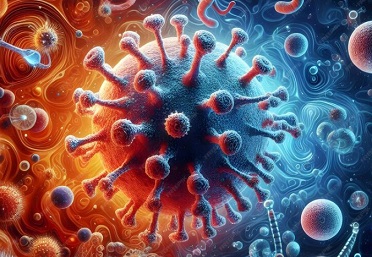Nikhil Prasad Fact checked by:Thailand Medical News Team May 28, 2024 10 months, 4 weeks, 21 hours, 48 minutes ago
Medical News: Viruses that can cause global health crises often emerge suddenly and unexpectedly. Recent genetic studies have revealed that these pathogens, though not entirely new, undergo genetic changes that can transform them into significant threats. A groundbreaking study led by virologists at the German Cancer Research Center (DKFZ) that is covered in this
Medical News report, has uncovered how genetic exchanges between different virus species can create novel, potentially more dangerous viruses.
 New Nidoviruses: The Next Global Health Challenge?
A New Method for Virus Detection
New Nidoviruses: The Next Global Health Challenge?
A New Method for Virus Detection
Dr Stefan Seitz and his team from DKFZ, along with Chris Lauber's group from the Helmholtz Center for Infection Research, have developed a revolutionary computer-assisted analysis method. This technique allowed them to discover 40 previously unknown nidoviruses in various vertebrates, including 13 new coronaviruses. Using high-performance computers, the team analyzed nearly 300,000 data sets to identify these new viruses.
The ability to process such large volumes of data opens new avenues for understanding the natural reservoir of viruses. This is crucial because only a small fraction of the viruses that exist in nature are currently known, particularly those that cause diseases in humans, animals, and plants. The new method promises to significantly expand our knowledge of viral diversity.
The Role of Nidoviruses
Nidoviruses, which include coronaviruses, have RNA as their genetic material and are widespread among vertebrates. Despite their genetic differences, these viruses share common characteristics that link them together. One significant discovery is that these viruses can exchange genetic material in hosts infected with multiple viruses, leading to the creation of viruses with new, potentially more dangerous properties.
In fish, for instance, nidoviruses frequently exchange genetic material across different virus species. This genetic recombination can result in viruses with entirely new traits, potentially increasing their ability to infect different hosts or making them more virulent.
Implications for Human Health
The potential for such genetic exchanges is not limited to fish. Seitz suggests that similar processes likely occur in mammals. Bats, known for carrying multiple viruses, are a prime example. The SARS-CoV-2 coronavirus, responsible for the COVID-19 pandemic, is believed to have originated in bats before jumping to humans.
Changes in the spike protein, which allows viruses to attach to host cells, are particularly concerning. These changes can increase a virus's infectiousness or enable it to infect new host species, including humans. As the COVID-19 pandemic has shown, a virus that jumps from animals to humans can spread rapidly and cause widespread health crises.
Advancing Virus Detection and Prevention
The new high-performance computing process developed by Dr Seitz and his team could play a
crucial role in preventing future pandemics. This technology allows for systematic searches for virus variants that could be dangerous to humans. Seitz also sees potential applications in cancer research, as some cancers are known to be triggered by viruses. The HPC method could help identify previously undetected viruses that contribute to cancer risk.
A Revolution in Virus Research
The discovery of these 40 new nidoviruses highlights the immense genetic diversity among viruses and underscores the potential for significant changes in their behavior. This research marks a significant advancement in our ability to detect and understand these changes.
By leveraging existing genetic data from a wide range of vertebrates, researchers can now uncover previously unknown viruses and gain insights into how they evolve and spread. This approach represents a significant step forward in our efforts to prevent future global health crises.
In conclusion, the novel nidoviruses discovered through this research present both a potential threat and a valuable opportunity. Understanding the mechanisms of viral evolution and recombination is crucial for preparing for and preventing future pandemics. The integration of high-performance computing into virus research promises to revolutionize our ability to detect and respond to emerging viral threats, enhancing global health security.
The study findings were published in the peer reviewed journal: PLOS Pathogens.
https://journals.plos.org/plospathogens/article?id=10.1371/journal.ppat.1012163
For more on these novel Nidoviruses, keep on logging to Thailand
Medical News.
Read Also:
https://www.thailandmedical.news/news/breaking-news-besides-kp-3-another-newly-emerged-sars-cov-2-variant-lb-1-poses-a-major-threat-in-coming-months
https://www.thailandmedical.news/news/forget-about-sars-cov-2-flirt-variants-kp-1-1-and-kp-2-new-fluqe-variant-kp-3-expected-to-rapidly-become-globally-predominant-wreaking-havoc
